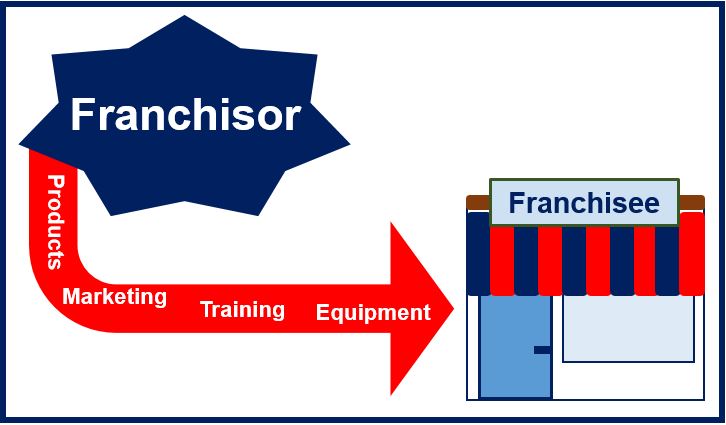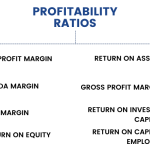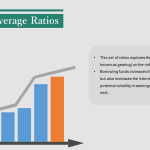
A franchise an authorisation granted by a government or company to an individual or group enabling them to carry out specified commercial activities, for example acting as an agent for a company’s products.
It is a type of license that grants a franchisee access to a franchisor’s proprietary business knowledge, processes and trademarks, thus allowing the franchisee to sell a product or service under the franchisor’s business name. In exchange for acquiring a franchise, the franchisee usually pays the franchisor an initial start-up fee and annual licensing fees.
Explanation

When a business wants to increase its market share or geographical reach at a low cost, it may franchise its product and brand name. A franchise is a joint venture between franchisor and franchisee. The franchisor is the original business. It sells the right to use its name and idea. The franchisee buys this right to sell the franchisor’s goods or services under an existing business model and trademark.
Franchises are a popular way for entrepreneurs to start a business, especially when entering a highly competitive industry such as fast food. One big advantage to purchasing a franchise is you have access to an established company’s brand name. You won’t need to spend resources getting your name and product out to customers.
Franchise Basics and Regulations
Franchise contracts are complex and vary for each franchisor. Typically, a franchise agreement includes three categories of payment to the franchisor. First, the franchisee must purchase the controlled rights, or trademark, from the franchisor in the form of an upfront fee. Second, the franchisor often receives payment for providing training, equipment or business advisory services. Finally, the franchisor receives ongoing royalties or a percentage of the operation’s sales.
A franchise contract is temporary, akin to a lease or rental of a business. It does not signify business ownership by the franchisee. Depending on the contract, franchise agreements typically last between five and 30 years, with serious penalties if a franchisee violates or prematurely terminates the contract.
Franchise Agreement
The franchise agreement is a written legal document between the franchisor and franchisee. The franchise agreement is the fundamental document upon which the franchisor-franchisee relationship is based on. The franchisor and franchisee must both sign the agreement. The following are some of the major aspects covered in a franchise agreement:
- Details about the franchisor and franchisee
- Appointment of franchisee and grant of a license
- Location of the franchisee
- Development of the franchisee location
- Maintenance of the franchisee location
- Proprietary marks or trademarks the franchisee can use
- Licenses or permissions the franchisee must obtain or can use from the franchisor
- Operation standards
- Quality standards
- Training and assistance from the franchisor, if any
- Consideration for granting franchisee
- Franchisee license fee, if any
- Marketing assistance from Franchisor, if any
- Products or Services that can be offered by the Franchisee
- Franchisee obligations
- Franchisor obligations
- Terms of the franchise agreement
- Tenure of the franchise agreement
- Renewal of the franchise agreement
- Termination of the franchise agreement
Pros and Cons of Franchises
There are many advantages to investing in a franchise, and also drawbacks. Widely recognized benefits include a ready-made business formula to follow. A franchise comes with market-tested products and services, and in many cases established brand recognition. If you’re a McDonald’s franchisee, decisions about what products to sell, how to layout your store, or even how to design your employee uniforms have already been made. Some franchisors offer training and financial planning, or lists of approved suppliers. But while franchises come with a formula and track record, success is never guaranteed.
Disadvantages include heavy start-up costs as well as ongoing royalty costs. To take the McDonald’s example further, the estimated total amount of money it costs to start a McDonald’s franchise ranges from $1 million to $2.25 million. By definition, franchises have ongoing fees that must be paid to the franchisor in the form of a percentage of sales or revenue. This percentage can range between 4.6% and 12.5%, depending on the industry7.
For uprising brands, there are those who publicize inaccurate information and boast about rating, rankings and awards that are not required to be proven. So, franchisees might pay high dollar amounts for no or low franchise value. Franchisees also lack control of over territory or creativity with their business. Financing from the franchisor or elsewhere may be difficult to come by. Other factors that impact all businesses, such as poor location or management, are also possibilities.
Franchise vs. Startup
If you don’t want to run a business based on someone else’s idea, you can start your own. But starting your own company is risky, though it offers rewards both monetary and personal. When you start your own business, you’re on your own. Much is unknown. Will my product sell? Will customers like what I have to offer? Will I make enough money to survive?
The failure rate for new businesses is high. Roughly 20% of startups don’t survive the first year. About 50% last until year five, while just 30% are still in business after 10 years. If your business is going to beat the odds, you alone can make that happen. To turn your dream into reality, expect to work long and hard hours with no support or expert training. If you venture out solo with little or no experience, the deck is stacked against you. If this sounds like a big burden, the franchise route may be a wiser choice.
People typically purchase a franchise because they see other franchisees’ success stories. Franchises offer careful entrepreneurs a stable, tested model for running a successful business. On the other hand, for entrepreneurs with a big idea and a solid understanding of how to run a business, launching your own startup presents an opportunity for personal and financial freedom. Deciding which model is right for you is a choice only you can make.
Advantages of Franchises
Some of the widely recognized advantages of franchises include a ready-made business formula to follow, market-tested products and services, and, in many cases, established brand recognition. For example, if you’re a McDonald’s franchisee, decisions about what products to sell, how to layout your store, or even how to design your employee uniforms have already been made. Some franchisors offer training and financial planning, or lists of approved suppliers. However, despite these benefits, success is never guaranteed.
Risks of Franchises
Disadvantages include heavy start-up costs as well as ongoing royalty costs. By definition, franchises have ongoing fees that must be paid to the franchisor in the form of a percentage of sales or revenue. This percentage can range between 4.6% and 12.5%, depending on the industry.
There is also the risk of a franchisee being duped by inaccurate information and paying high dollar amounts for no or low franchise value. Franchisees also lack control over territory or creativity with their business. Financing from the franchisor or elsewhere may be difficult to come by and franchisees could be adversely affected by poor location or management.
Ways Franchisor Make Money
Typically, a franchise agreement includes three categories of payment to the franchisor.
First, the franchisee must purchase the controlled rights, or trademark, from the franchisor in the form of an upfront fee.
Second, the franchisor often receives payment for providing training, equipment or business advisory services.
Finally, the franchisor receives ongoing royalties or a percentage of the operation’s sales.
Franchising Cost for Famous Brands
The following are the estimated cost for obtaining a franchisee of the brand. They are just indicative figures and can vary:
Fab India Franchising Cost
Selling of garments, home products, personal care products, etc.,
Investment: 30- 50 lakhs. ; Annual Brand Fee: 2 – 5 lakhs.
Snap Fitness Franchising Cost
High-end health and fitness centre.
Investment: Rs.100 – 200 lakhs; Annual Brand Fee: Rs.15 – 20 lakhs.
Naturals Salon Franchising Cost
Health and beauty salon.
Investment: Rs. 30 – 50 lakhs; Annual Brand Fee: Rs. 3 – 7 lakhs.
Sunglass Hut Franchising Cost
Eyewear and accessories retailing.
Investment: Rs.30 – 50 lakhs; Annual Brand Fee: Rs.2 – 5 lakhs.
Classic Polo Franchising Cost
Men’s fashion and clothing retailing.
Investment: Rs.5 – 25 lakhs; Annual Brand Fee: NIL – 2 lakhs.
Financial and Business expert having 30+ Years of vast experience in running successful businesses and managing finance.




